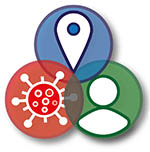
Report explores perceptions of COVID-19 virus transmission risk on public transport
A report published today as part of the PROTECT COVID-19 National Core Study on transmission and environment explores perceptions of the risk of transmission of SARS-CoV-2 (the virus that caused COVID-19) and of the effectiveness of controls implemented on public transport in the UK.
The report, produced as part of one of a number of sector-specific studies being carried out under Theme 3 of PROTECT, describes qualitative research carried out by researchers from the University of Manchester and the Health and Safety Executive between January and May 2021. This research included interviews with sector experts, transport companies, unions, workers and passengers.
The researchers found that the perception of risk to individuals on public transport was generally low, and that the controls put in place were perceived to be effective.
However, perceptions of safety and risk were found to be dependent on compliance with behavioural measures, such as the wearing of face coverings, by fellow passengers and staff. Confidence in using public transport was also impacted by transmission rates in society at the time, vaccine uptake, and the emergence of new virus variants.
These views may have changed since the removal of UK Government restrictions and the rise of passenger numbers back towards pre-pandemic levels, and so the team are currently carrying out a limited follow-up study to assess any subsequent shifts in perception.
The researchers make a number of recommendations to help the public transport sector address virus transmission going forwards, including maintaining industry forums established during the pandemic, collaborative development of messages and communications to passengers and staff, and clearer lines of accountability for compliance with guidance.






0 Comments